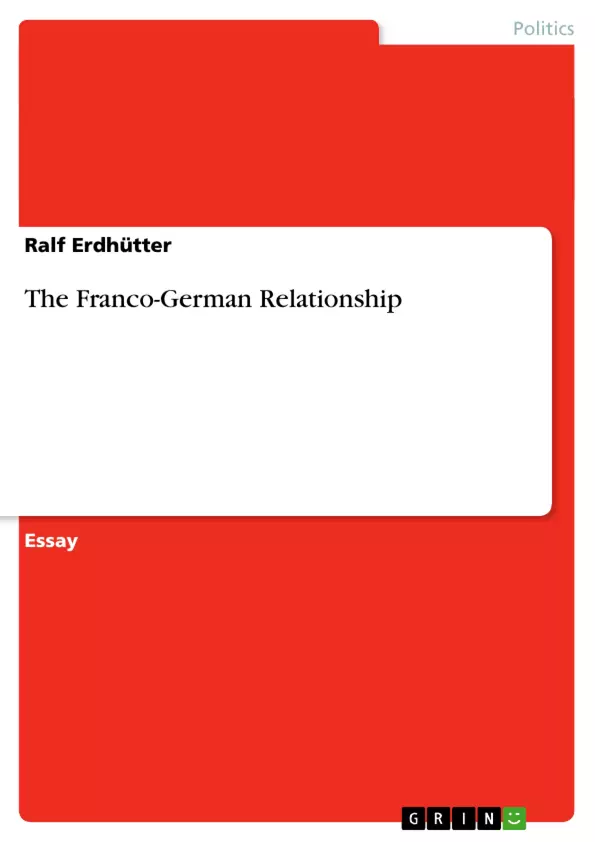Since the post-war period, and since the Elysée Treaty was signed in 1963, the Franco-German relationship has been and continues to be the driving force in Europe. The co-operation between the governments is extraordinarily close and institutionalized due to the Elysée Treaty and its amendment of 1988. To name just a few examples: • half- yearly government consultations (summits), which, since 1999, have focused on current topics of society in both countries and therefore go beyond simple co-operation between governments, • the German-French Security and Defense Council, • the Councils for Economic, Financial and Environmental Affairs and • the coordinators for German-French co-operation, which devote most of their attention today to the field of civil society In addition, since the beginning of 2001, heads of state and government and the foreign ministers of both countries have been holding informal meetings every 6-8 weeks for open and intense discussion on current topics of European and international interest (Blaesheim talks). Both countries have played a pioneering role in defense policy by founding the Eurocorps and both are actively participating in the creation of a European Security and Defense Policy. And Germany and France are each other's most important partners in international co-operation on armaments. France is Germany's closest and most important partner in Europe. With no other country does it coordinate all its policies more extensively or regularly. With the joint plenary session of the German Bundestag and the National Assembly on the 40th anniversary of the signing of the Elysée Treaty, the parliaments reaffirmed and stepped up their close cooperation, including: [...
Inhaltsverzeichnis (Table of Contents)
- Political relations
- Economic relations
- Cultural relations
- The "deep, underlying strategies" of the Franco-German relationship
- Some differences
- The Iraqi crisis
- Looking to the future of the special relations between Germany and France
Zielsetzung und Themenschwerpunkte (Objectives and Key Themes)
This essay examines the long-standing and complex relationship between France and Germany, focusing on their political, economic, and cultural interactions. It delves into the historical evolution of this partnership, exploring the key events and personalities that have shaped it. The essay also analyzes the strategies and motivations behind the Franco-German relationship, highlighting the deep underlying factors that have driven its development.
- The role of the Elysée Treaty and its impact on Franco-German relations.
- The evolution of political, economic, and cultural cooperation between the two countries.
- The influence of key political figures in shaping the relationship.
- The impact of historical factors, particularly the "Erbfeindschaft" and its legacy.
- The role of Franco-German relations in European integration.
Zusammenfassung der Kapitel (Chapter Summaries)
- Political relations: This chapter explores the evolution of political cooperation between France and Germany, highlighting the role of the Elysée Treaty and its subsequent amendments. It also examines the various institutional mechanisms established to foster cooperation, including regular government consultations and the German-French Security and Defense Council.
- Economic relations: This chapter analyzes the strong trading relationship between France and Germany, emphasizing their status as each other's most important trading partners. It also discusses the significant direct investments made by both countries and their combined economic influence within the Eurozone.
- Cultural relations: This chapter examines the close cultural and social ties between France and Germany, focusing on youth exchange programs, twinning partnerships, and cooperation in education and culture.
- The "deep, underlying strategies" of the Franco-German relationship: This chapter explores the historical and strategic factors driving the Franco-German relationship. It examines the motivations and policies of key political figures, such as Konrad Adenauer, Charles de Gaulle, and Helmut Schmidt, and discusses the impact of generational changes and geopolitical shifts.
Schlüsselwörter (Keywords)
Franco-German relations, Elysée Treaty, European integration, political cooperation, economic interdependence, cultural exchange, "Erbfeindschaft", post-war Europe, strategic partnership, European Union, Eurozone.
Frequently Asked Questions
What is the significance of the Elysée Treaty?
Signed in 1963, the Elysée Treaty institutionalized the Franco-German relationship, establishing regular summits and cooperation in foreign, defense, and cultural affairs to end centuries of rivalry.
How close is the economic cooperation between France and Germany?
France and Germany are each other's most important trading partners in Europe. Their economies are deeply integrated, particularly within the Eurozone, where they act as a combined economic engine.
What are "Blaesheim talks"?
These are informal meetings between the heads of state and foreign ministers of both countries, held every 6-8 weeks since 2001 to discuss current European and international interests intensely.
What role do both countries play in European defense?
They have played a pioneering role by founding the Eurocorps and are central to the creation of a common European Security and Defense Policy (ESDP).
How do cultural relations support the partnership?
Cultural relations are maintained through extensive youth exchange programs, city twinning, and educational cooperation, which aim to build mutual understanding among the younger generations.
- Quote paper
- Ralf Erdhütter (Author), 2005, The Franco-German Relationship, Munich, GRIN Verlag, https://www.grin.com/document/39264



